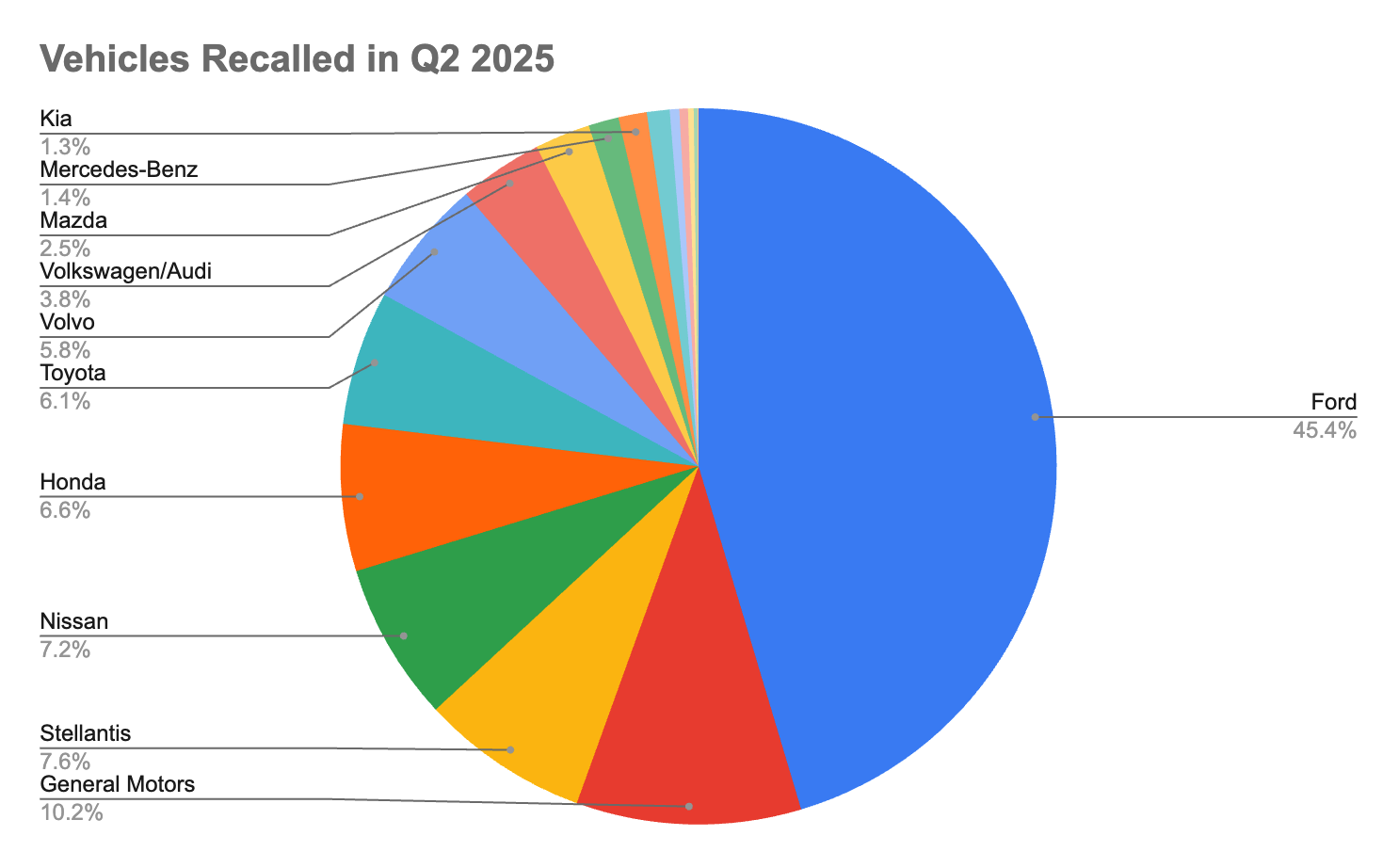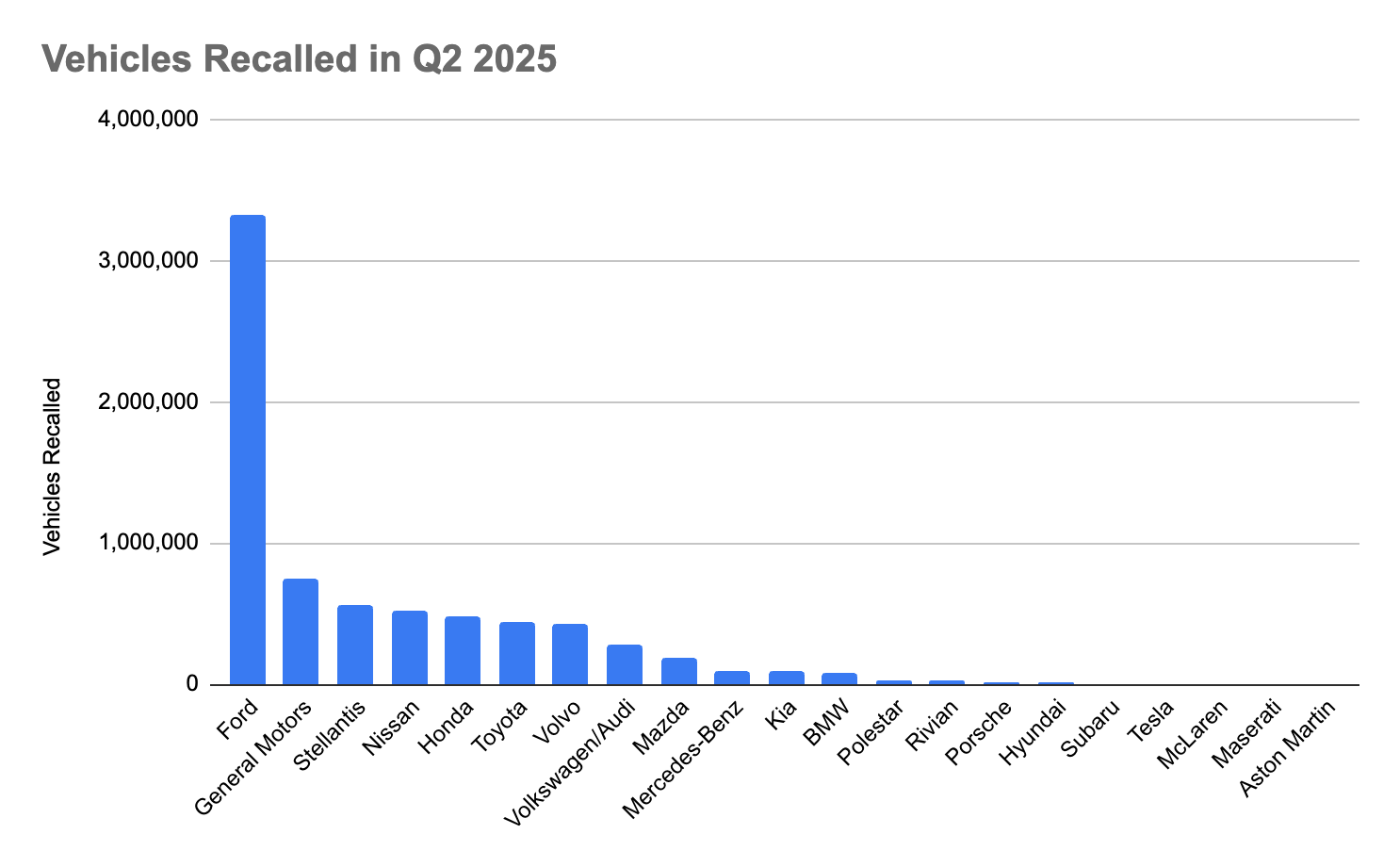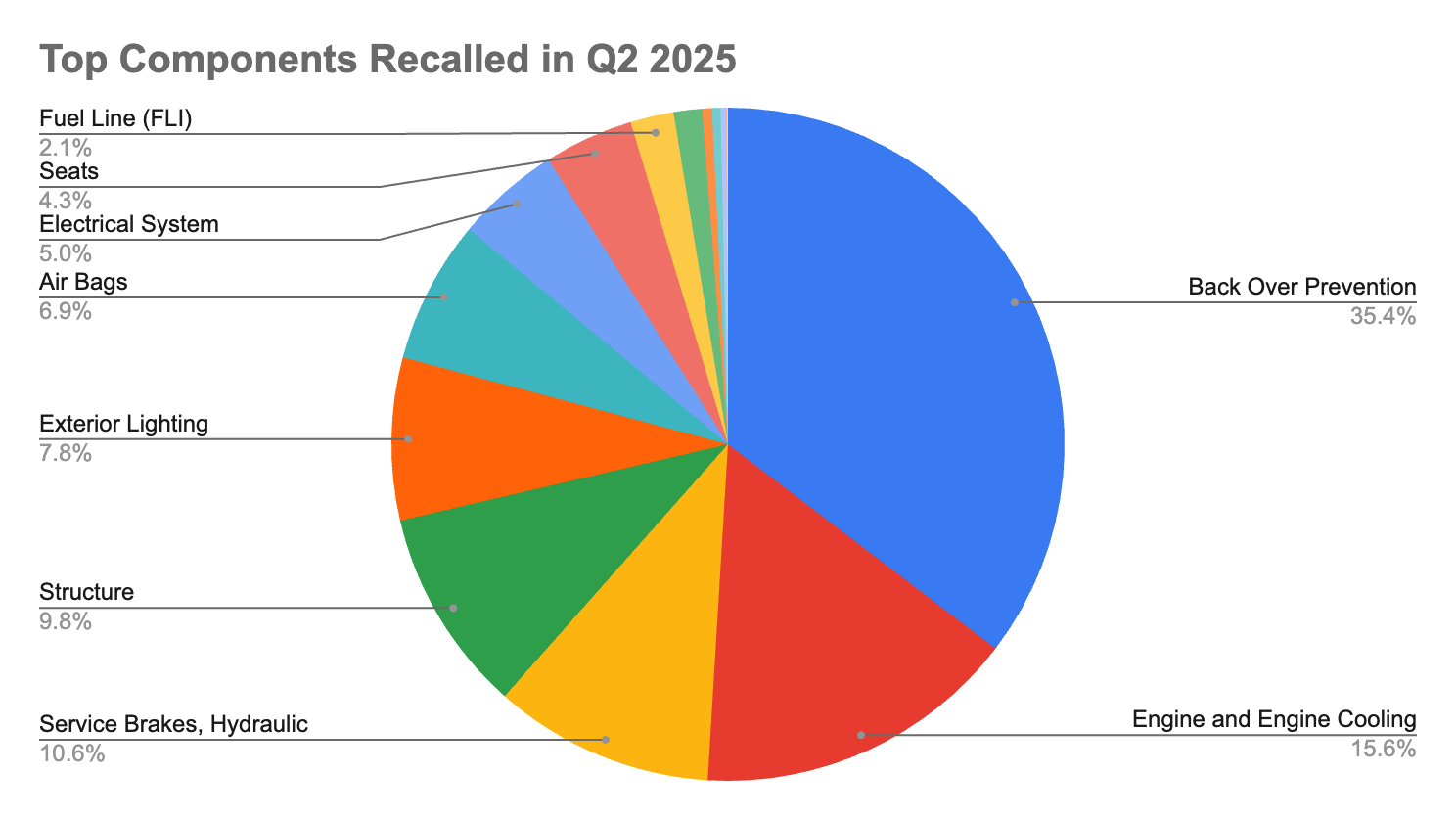In recent news, an astonishing 3.7 million cars on the road are subject to 'park outside' open...
Automotive Recall Alert: Over 7.3 Million Vehicles Recalled in Q2 2025
 The BizzyCar Q2 2025 Recall Report provides a clear look at the shifting landscape of automotive safety and quality challenges. In the second quarter of 2025, the U.S. auto industry recorded over 7.3 million vehicles recalled, the highest quarterly total since early 2024 and a sharp reversal from the low number in the first quarter of this year. As automakers continue to navigate supply chain pressures, evolving technology, and rising consumer expectations, recalls remain a crucial touchpoint for protecting drivers and building customer trust. This report highlights the brands, components, and trends driving today’s recalls, examines the growing role of Over-the-Air (OTA) updates, and underscores why proactive recall management is essential for every dealership’s fixed ops strategy.
The BizzyCar Q2 2025 Recall Report provides a clear look at the shifting landscape of automotive safety and quality challenges. In the second quarter of 2025, the U.S. auto industry recorded over 7.3 million vehicles recalled, the highest quarterly total since early 2024 and a sharp reversal from the low number in the first quarter of this year. As automakers continue to navigate supply chain pressures, evolving technology, and rising consumer expectations, recalls remain a crucial touchpoint for protecting drivers and building customer trust. This report highlights the brands, components, and trends driving today’s recalls, examines the growing role of Over-the-Air (OTA) updates, and underscores why proactive recall management is essential for every dealership’s fixed ops strategy.
BizzyCar Q2 2025 Recall Report Highlights
Total Recalls:
7,322,767 vehicles were recalled in Q2 2025, the highest quarterly total since Q1 2024’s 9.9 million. This is a sharp rise from Q1’s 3.46 million.
Ford Leads All Automakers:
Ford accounted for 3,322,450 vehicles recalled in Q2 across 49 campaigns, representing 45.3% of all vehicles recalled this quarter and 40.6% of all vehicles recalled so far in 2025.
Top Recall Issues:
Back-Over Prevention was the leading recalled component, with 2.59 million vehicles affected. Other major areas included Engine and Engine Cooling (1.14 million) and Service Brakes, Hydraulic (775K), highlighting the continuing focus on critical safety systems.
Safety Concerns:
6.9 million vehicles, 94.6% of all Q2 recalls, pose a risk of crash or injury if repairs are not completed promptly. Q2 also saw three recalls with Park Outside advisories affecting 63,545 vehicles and three Do Not Drive recalls, all from Ford, covering 2,350 vehicles.
OTA Updates Expand:
10 recalls affecting 1,098,507 vehicles (15% of Q2 total) can be completed via Over-the-Air (OTA) software updates, part of a wider industry trend, with nearly 15 million OTA-addressed recalls since Q1 2022 (14.7% of all recalls during that period).
BizzyCar Q2 2025 Recall Report
Total Recalls and Vehicles Affected
-
Total Recalls Issued in Q2 2025: 122 recalls
-
Total Vehicles Affected in Q2 2025: 7,322,767 vehicles
-
YTD 2025 Total Vehicles Affected (Q1 + Q2): 10,785,741 vehicles


Q2 2025 Recalls Issued by Brand
-
Ford: 49 recalls
-
Stellantis: 9 recalls
-
Volkswagen/Audi: 9 recalls
-
Honda: 8 recalls
-
Mercedes-Benz: 8 recalls
-
General Motors: 7 recalls
-
Mazda: 4 recalls
-
Polestar: 4 recalls
-
BMW: 3 recalls
-
Porsche: 3 recalls
-
Hyundai: 3 recalls
-
Nissan: 2 recalls
-
Volvo: 2 recalls
-
Kia: 2 recalls
-
Rivian: 2 recalls
-
Tesla: 2 recalls
-
Toyota: 1 recall
-
Subaru: 1 recall
-
McLaren: 1 recall
-
Maserati: 1 recall
-
Aston Martin: 1 recall

Q2 2025 Vehicles Affected by Brand
| Manufacturer | Vehicles Recalled |
|---|---|
| Ford | 3,322,450 |
| General Motors | 743,355 |
| Stellantis | 556,308 |
| Nissan | 523,654 |
| Honda | 485,303 |
| Toyota | 443,444 |
| Volvo | 424,620 |
| Volkswagen/Audi | 276,817 |
| Mazda | 183,680 |
| Mercedes-Benz | 99,848 |
| Kia | 93,608 |
| BMW | 75,334 |
| Polestar | 31,501 |
| Rivian | 28,418 |
| Porsche | 18,590 |
| Hyundai | 12,618 |
| Subaru | 2,938 |
| Tesla | 220 |
| McLaren | 29 |
| Maserati | 21 |
| Aston Martin | 11 |


Ford Leads Recalls
Ford continues to top the industry in recall volume, accounting for more than 3.3 million vehicles recalled in Q2 2025 alone, nearly half of all vehicles affected this quarter. The brand’s elevated numbers reflect the ongoing complexity of managing modern vehicle systems, from back-over prevention cameras to critical safety components like seats and brake lines. While Ford has made strides in quality assurance in recent years, its position as the leading OEM for recalls highlights how even the largest automakers face persistent challenges as vehicles become more technologically advanced. For dealerships, this volume underscores a major opportunity: Ford’s high recall count means a larger pool of owners who can be brought back to the service lane, strengthening relationships and boosting retention through fast, safe repairs.
Top Components Recalled in Q2 2025
| Component | Vehicles Affected |
|---|---|
| Back Over Prevention | 2,590,688 |
| Engine and Engine Cooling | 1,141,041 |
| Service Brakes, Hydraulic | 775,148 |
| Structure | 718,116 |
| Exterior Lighting | 571,373 |
| Air Bags | 503,643 |
| Electrical System | 366,608 |
| Seats | 313,370 |
| Fuel Line (FLI) | 152,800 |
| Power Train | 99,847 |
| Suspension | 34,321 |
| Latches/Locks/Linkages | 29,770 |
| Electronic Stability Control (ESC) | 18,497 |
| Seat Belts | 3,809 |
| Visibility | 3,074 |
| Equipment | 347 |
| Tires | 304 |
| Fuel System, Gasoline | 6 |
| Fuel System, Diesel | 5 |

10 Largest Recalls of Q2 2025
| Manufacturer | Subject | Component | Campaign No. | Type | Vehicles Affected | Description |
|---|---|---|---|---|---|---|
| Ford | Rearview Camera Image May Not Display | Back Over Prevention | 25S49 | Vehicle | 1,075,299 | Certain 2021–2024 Bronco, F-150, Edge, Escape, F-Series, Expedition, Transit, Mach-E, Ranger, Mustang, Lincoln Nautilus, Navigator, Corsair. A software error may cause the rearview camera image to delay, freeze, or not display. |
| General Motors | Engine Failure | Engine and Engine Cooling | N252494000 | Vehicle | 597,571 | Certain 2021–2024 Cadillac Escalade, Escalade ESV, Chevrolet Silverado 1500, Suburban, Tahoe, GMC Sierra 1500, Yukon, Yukon XL. Engine defects may cause engine failure. |
| Ford | Driver and Passenger Door Trim May Detach | Structure | 25S53 | Vehicle | 492,145 | Certain 2016–2017 Explorer. Driver and passenger B-Pillar door trim may detach while driving. |
| Nissan | Engine Failure | Engine and Engine Cooling | TBD | Vehicle | 443,899 | Certain 2021–2024 Rogue, 2019–2020 Altima, 2019–2022 Infiniti QX50, 2022 Infiniti QX55. Engine bearing defects may lead to failure. |
| Toyota | Vehicle Lighting Failure | Exterior Lighting | 25TB06 / 25TA06 | Vehicle | 443,444 | Certain 2022–2025 Toyota Tundra & Tundra Hybrid. Moisture in reverse light assemblies may cause failure. |
| Volvo | Rearview Camera Image May Not Display / FMVSS 111 | Back Over Prevention | R10320 | Vehicle | 413,151 | Certain 2021–2025 XC40, V90, S90, V90CC, C40, XC60, S60, V60, XC90, EC40, EX40. Rearview camera may fail to display. |
| Ford | Second-Row Seat May Move Unexpectedly | Seats | 25S67 | Vehicle | 304,662 | Certain 2020–2025 Aviator, Explorer. Easy-entry second-row seat switch may bind or stick, causing seats to unlatch or slide unexpectedly. |
| Ford | Loss of Brake Function from Brake Fluid Leak | Service Brakes, Hydraulic | 25S47 | Vehicle | 273,789 | Certain 2022–2024 Navigator and Expedition. Front brake lines may contact engine air cleaner outlet pipe, leading to damage and brake fluid leaks. |
| Honda | Brake Pedal May Shift Out of Position / FMVSS 108 & 135 | Service Brakes, Hydraulic | FLX, XLY | Vehicle | 259,033 | Certain 2021–2025 Acura TLX, 2023–2025 Acura MDX, 2023–2025 Honda Pilot. Brake pedal pivot pin not secured properly can cause the pedal to shift out of position. |
| Stellantis | Improperly Sealed Side Curtain Air Bag / FMVSS 226 | Air Bags | 06C, 54C, 55C | Vehicle | 250,651 | Certain 2022–2025 Pacifica and Voyager. Side curtain air bags may have insufficient pressure retention due to improperly sealed seams. |
Park Outside and Do Not Drive Advisories
Park Outside:
-
Ford: High Voltage Battery Water Damage, 457 vehicles
-
Hyundai: Electric Oil Pump May Overheat, 620 vehicles
-
General Motors: Brake Pressure Switch May Short, 62,468 vehicles
Do Not Drive (Ford):
-
Loss of Steering from Front Control Arm Separation
-
Front Lower Control Arm May Detach
-
Sudden Loss of Brake Function
Affecting 2,350 vehicles
OTA Updates in Q2 2025
1,098,507 vehicles, 15% of all vehicles recalled in Q2 2025, can be repaired via Over-the-Air (OTA) software updates.
Brands with OTA-eligible recalls in Q2 2025:
-
Toyota: 443,444 vehicles
-
Volvo: 424,620 vehicles
-
Kia: 82,281 vehicles
-
BMW: 70,852 vehicles
-
General Motors: 41,376 vehicles
-
Ford: 30,679 vehicles
-
Polestar: 3,666 vehicles
-
Hyundai: 1,589 vehicles
Since Q1 2022, 14,923,629 recalls have been addressed via OTA updates, accounting for 14.7% of all recalls in that time frame.
Why In-Person Visits Still Matter
While OTA updates are convenient, they eliminate critical dealership touchpoints:
-
Inspections: Additional issues can be caught early.
-
Upsell Potential: In-person visits create revenue opportunities.
-
Customer Loyalty: Positive experiences build trust.
-
Trade-In and New Sales: Great timing to explore upgrades.
-
Future Scheduling: Lock in future service appointments.
YTD 2025 (Q1 + Q2) Vehicles Affected by Brand
| Manufacturer | Vehicles Recalled (YTD 2025) |
|---|---|
| Ford | 4,379,679 |
| General Motors | 918,768 |
| Honda | 794,571 |
| Toyota | 760,803 |
| Tesla | 662,030 |
| Stellantis | 636,691 |
| Volkswagen/Audi | 569,010 |
| Nissan | 562,286 |
| Kia | 385,930 |
| Volvo | 434,179 |
| Mazda | 183,743 |
| Mercedes-Benz | 130,661 |
| BMW | 116,427 |
| Hyundai | 46,832 |
| Rivian | 45,678 |
| Jaguar Land Rover | 43,718 |
| Polestar | 31,501 |
| Maserati | 27,375 |
| Subaru | 23,304 |
| Porsche | 19,747 |
| Ineos Automotive | 7,022 |
| Lucid | 4,294 |
| Aston Martin | 1,463 |
| McLaren | 29 |



BizzyCar Commentary: What’s Ahead
BizzyCar’s exclusive data shows Q2 2025 recalls were a reversion to the recent mean, tracking within 10% of the average quarterly total for the past few years. Looking forward, BizzyCar analysts see potential increases ahead as supply chain challenges and global tariffs impact OEM parts flow. This could mirror trends seen in 2020–2021, when global shortages forced automakers to ship vehicles that later required retrofitting, driving up recall volumes significantly.
On OTA recalls, BizzyCar emphasizes that this category remains spiky, heavily influenced by OEM mix, recall nature, and whether a software fix is practical. Tesla alone accounts for over 77% of all OTA recalls in the past three years, but the reality is most hardware issues, especially with today’s complex electrical systems, cannot be solved purely through software. Even when OTA updates are technically feasible, most software fixes still occur through certified dealer service or mobile operations.
BizzyCar’s Guidance for Dealers & Drivers
For Dealers:
BizzyCar strongly advises all dealerships to keep recalls at the center of their fixed ops strategy. The best dealerships have dedicated processes and people for recall outreach and scheduling, converting safety compliance into new customer connections, service lane revenue, and lifetime loyalty. For dealers launching or scaling mobile service operations, recall repairs are the perfect entry point, relatively low complexity and high consumer value.
The key is ease and convenience: making it simple for owners to book, arrive, and complete repairs turns a hassle into a loyalty moment.
For Consumers:
BizzyCar reminds all vehicle owners: check your recalls, don’t delay repairs, and keep your family safe on the road. BizzyCar is helping franchise dealers make the recall appointment experience fast, open-ended, asynchronous, and consumer-friendly, because safer cars make better roads. Check for Recalls
BizzyCar’s Commitment
At BizzyCar, we help dealerships close recalls faster, keep drivers safer, and protect your bottom line. With vehicles only getting more complex, our smart platform ensures you stay ahead, transforming every recall into a stronger customer relationship.
Q1 2025 Recall Data Source: https://datahub.transportation.gov/Automobiles/NHTSA-Recalls-by-Manufacturer/mu99-t4jn
About BizzyCar
BizzyCar is an AI-driven, automated Service Recall Management Platform for auto dealers. It leverages the most accurate recall data available to identify vehicles with open recalls and utilizes artificial intelligence to proactively schedule recall appointments for customers to bring their vehicles into the dealership to complete these recalls. For more info visit: https://info.bizzycar.com/blog



